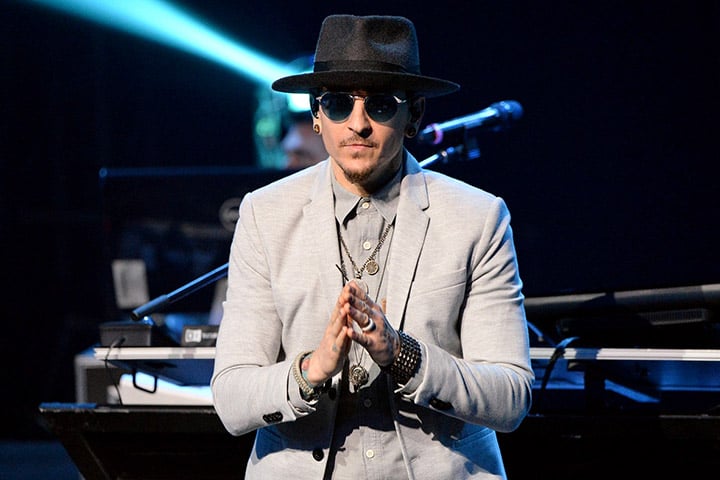There was a lot of memorial at Harlem’s Apollo Theater on Thursday, during Guns N’ Roses’ marathon show there, broadcast live on Sirius XM Radio. Late in the second of the concert’s three hours, singer Axl Rose shuffled off stage, leaving the spotlight to guitarists Slash and Richard Fortus and their instrumental duet through Pink Floyd’s title song of missing from 1975’s Wish You Were Here. When Rose reappeared, he took a seat at his piano and led the band into the wordless-elegy half of “Layla” by Derek and the Dominos.
Rose made no comment in between or after, steering Guns N’ Roses into their own “November Rain.” It was a fitting segue: “Love is always coming and love is always going,” Rose sang, “and no one’s really sure who’s lettin’ go today.” Then GN’R reiterated what a great covers act they can be, putting their own heavy stamp on Soundgarden’s “Black Hole Sun” in memory of singer Chris Cornell, who died by his own hand in May.
That has been a nightly sequence for GN’R, capped by their version of Bob Dylan’s “Knockin’ on Heaven’s Door.” But when Slash and Fortus, in the encore, opened “Patience” with a flourish of the late Gregg Allman’s “Melissa,” it was hard not to hear the mounting toll of loss in rock, just this year – and the new ghost that had just entered the room.
At 9 a.m. that day in Los Angeles – just two months after Cornell’s death – Chester Bennington, the singer of the alternative-metal band Linkin Park was found dead at his home, another, apparent suicide by hanging. He was 41.
I met Bennington in early 2002, when I went to L.A. to write a Rolling Stone feature story on Linkin Park, their debut on the cover. By then, Linkin Park – Bennington, rapper Mike Shinoda, guitarist Brad Delson, drummer Rob Bourdon, bassist David “Phoenix” Farrell and DJ Joseph Hahn – were one of the biggest new rock groups in the world. Their first album, Hybrid Theory – released in 2000 and a rare thing in that era’s uneasy fusion of punk, metal and hip-hop: cohesive, articulate and compelling – had sold 6 million copies in the U.S. and more than 11 million worldwide. And Linkin Park were about to go back on tour, after already spending more than a year on the road.
At that point, even in rehearsal, they still played like a band with everything to prove. Bennington was the last to join, emigrating from Phoenix in 1999 when the others were calling themselves Xero, on an invite from their A&R man. They played 42 showcases for record labels, Bennington told me on that trip, and “got turned down by everybody.” But I noted one of the bonds that survived that rejection and would keep Linkin Park intact for 15 years – successful and evolving on records like their 2004 collaboration with Jay-Z, Collision Course, and 2007’s Minutes to Midnight, made with producer Rick Rubin. “Bennington and Shinoda shoot and share rhythms like they’re joined at the lip,” I wrote, “their bodies rocking in spasms of conviction.”
My interview with Bennington took place in a restaurant in Santa Monica; his first wife, Samantha, joined us. It was an occasion for celebration too. A couple of weeks earlier, on January 2nd, 2002, the singer had stopped drinking. The couple toasted his new leaf with mineral water. But he spoke about his previous addictions – cocaine and methamphetamines as a teenager; a recent, blinding patch of alcoholism – like they were permanent shadows, a daily lesson in self-worth.
 Chester Bennington in 2001
Chester Bennington in 2001“It’s easy to fall into that thing – ‘poor, poor me,'” Bennington said. He also cited “Crawling” on [Hybrid Theory] as “a song about taking responsibility for your actions. I don’t say you at any point. It’s about how I’m the reason that I feel this way.”
Reading that story again, in the hours after Bennington’s body was found and then after that Guns N’ Roses show, I was reminded of the temporal fragility of what I do as a journalist. I write about music and musicians for, hopefully, posterity. I am also reliant on the truths evident at the time – what people believe, about their art and themselves, at the moment we speak. And I have learned that, repeatedly, the hard way – from Kurt Cobain, Scott Weiland and Cornell, among others.
I did not get to revisit those truths, about music and life in 2002, with Bennington. He was very public about his later battles with substance abuse in other publications and websites. But the 2002 Rolling Stone story was my only in-depth interview with him and my only major piece on Linkin Park. Still I remained a listener and intrigued. Bennington was a powerful, searching singer, with a shapeshifting finesse and firm sense of melody in his range: blazing saw-toothed ferocity; low, seething menace; choppy, hip-hop-style challenge; grainy, plaintive introspection. I thought his 2013 EP as Weiland’s replacement in Stone Temple Pilots, High Rise, was a promising tangent, a chance for Bennington to bind those voices in classic heavy-rock songwriting. Instead, STP are mourning another frontman; Linkin Park have lost a singer and much more; and I am writing about another musician who chose to leave, too soon and without warning.
At the Apollo, Guns N’ Roses slipped another cover into the encore, the Who’s 1970 single “The Seeker.” They played it like cocksure romp. But, after the news about Bennington, I kept getting a chill when Rose sang the last line in the chorus: “I won’t get to get what I’m after/Til the day I die.” Back in May, after Cornell’s suicide, Bennington posted a note to the singer on social media. “I can’t imagine a world without you in it,” he wrote. “I pray you find peace in the next life.”
Now it’s another seeker’s turn.






































